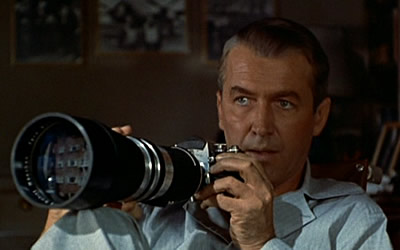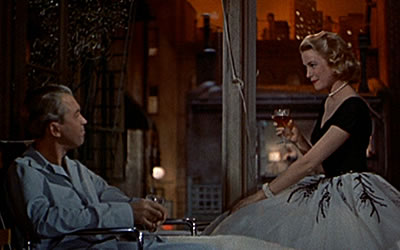
Stewart's Window into Hitchcock
Whilst many professional critics like to cite "Rear Window" as Alfred Hitchcock's greatest movie, I as a movie fan actually disagree and whilst I don't think it's a terrible movie there others of the master of suspense's works which I rate higher. There is something about "Rear Window" in the various story elements and their relation to each other as well as the focus of the movie which for me causes it to feel slightly unbalanced as if we get one story element to add an extra dimension to the movie but in doing so feels like padding until the main drama arrives.
Having broken his leg L.B. Jefferies (James Stewart - The Far Country) is confined to a wheelchair in his Manhattan apartment until it mends. To pass the time he observes those who live in the surrounding buildings, spying on them through the window of his apartment and into theirs, making up lives for these nameless faces he watches everyday. But when late one night he sees one of them behaving very suspiciously he believes that he may have witnessed a murder, or at least seen the aftermath of it. But with no proof he fails to convince his good friend detective Doyle (Wendell Corey - Holiday Affair) of the facts and even when things appear to be falling into place he still can't prove it. The only ones who believe him are his nurse and his gorgeous high society girlfriend Lisa (Grace Kelly - Mogambo).

The trouble for me is that the first half of "Rear Window" which provides the set up as expected seems to get side tracked by the relationship issues between Jefferies and his gorgeous Lisa, his high society girlfriend. There is a lot of attention placed upon this relationship as Jefferies questions whether they are right for each other, never coming up with a reason to end the relationship except that she is just far too perfect. I actually like this story element, it's a fascinating examination of a relationship especially one which appears to have suffered due to Jefferies current confined living arrangements but for me it just goes on too long padding out the initial part of the movie until all the actual drama arrives. Though saying that, it works as a perfect accompaniment to the voyeurism of Jefferies as he pries into the lives he watches from his apartment window, with aspects of the lives he watches mirroring his own such as the gorgeous Miss Torso the dancer who has the choice of suitors and Miss Lonelyhearts who drinks herself to sleep each night due to loneliness.
Despite my initial reservations over the first half of the movie, there is no doubt that "Rear Window" is extremely clever and in many ways classic Hitchcock. The enforced confinement, the mist between what Jefferies saw and didn't, all the little clues such as the dog sniffing around and various red herrings, there is plenty going on to draw you into this intriguing situation. It's also very clever that once you remove the romantic element to the storyline there are no superfluous sub-plots, yes there are the lives of those who live in the opposite apartments, but there is nothing which encroaches when the drama finally arrives. This is where Hitchcock really goes to town and by the time "Rear Window" starts to draw to a close you are on the edge of your seat, gripped by the unravelling of the story and the fear it instils as you watch.
What is also very clever is the way Hitchcock works with the limitation of Jefferies as he is forced to live in a wheel chair. What we see is basically what Jefferies sees the inside of his apartment and the view of the buildings opposite just far enough to take in the main street which borders the buildings. But it works well making us feel a little claustrophobic by the limited viewpoint and in doing so feel the desperation of Jefferies in his forced confinement. But it never feels small and the fact that most of the time we end up being voyeurs on the neighbours gives it a feeling of being bigger than it really is.
In their second of four collaborations Hitchcock manages to get a massive performance from James Stewart which is even more special seeing that Stewart spends the entire length of "Rear Window" confined to a wheelchair. It really is a brilliant performance where Stewart acts through his facial expressions and tone of voice delivering fear, humour and genuine drama through some wonderfully written dialogue. There is something completely believable about Stewart and like with many of his movies you get a sense that he is drawing in on his own experiences, fears and thoughts when creating this character.
Alongside Stewart is the divine Grace Kelly who as is often the case with these earlier movies doesn't have the most well defined character as the high society and glamorous Lisa. But even so Kelly brings her to life, making the character more than just eye candy and you honestly feel a sense of frustration where she is in love with this man yet he seems to be trying to become distant in fear of something. There is definitely chemistry between James Stewart and Grace Kelly and you get a sense that whilst Stewart did in many ways love her she was very comfortable in his presence.
As well as James Stewart and Grace Kelly "Rear Window" also features Wendell Cory as Detective Doyle and Raymond Burr as the suspected killer Lars Thorwald. But the stand out performance comes from Thelma Ritter as the wise talking nurse paid to look after Jefferies. Ritter is screen dynamite with her busy body attitude and know it all wise cracks that she brings much needed amusement to the movie.
What this all boils down to is "Rear Window" is a good movie, a clever movie with it's limited viewpoint and brilliant acting from James Stewart. But the way the movie builds the initial focus upon Jefferies doubts over his relationship seems to pad out the movie until the actual drama of the story appears. When it does it is as tense and moody as any of Hitchcock's movies but it just feels slightly unbalanced. "Rear Window" will certainly have you gripped once things get going and the chemistry between James Stewart and Grace Kelly is magical. I just wish that the initial build up didn't dwell so much on the relationship.





















